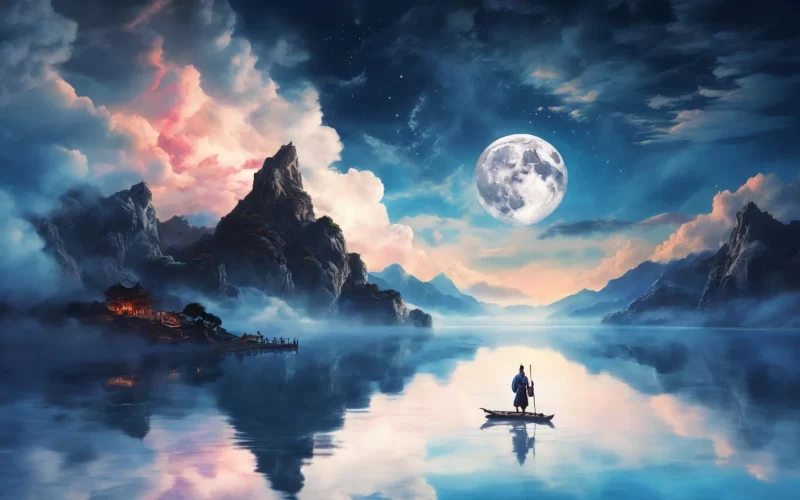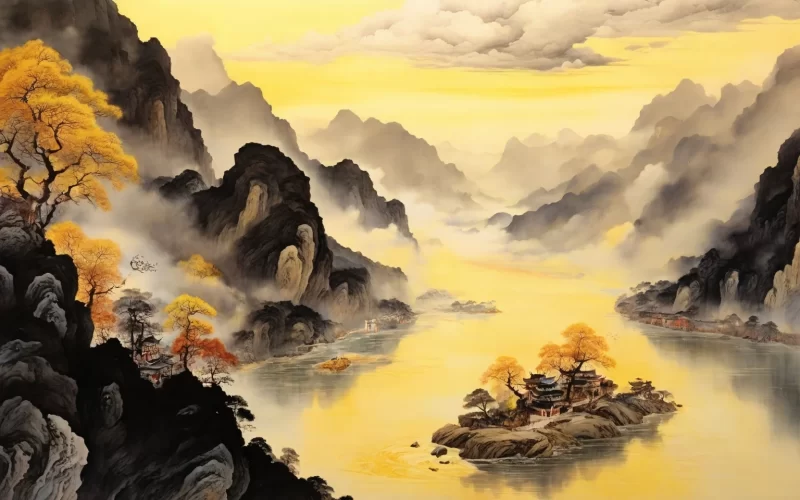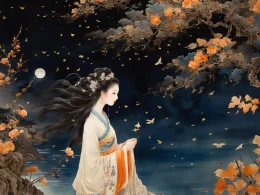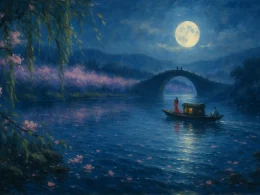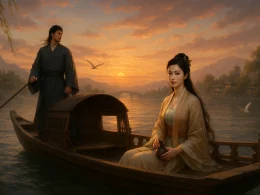A seafaring visitor will talk about Japan,
Which waters and mists conceal beyond approach;
But Yiieh people talk about Heavenly Mother Mountain,
Still seen through its varying deepnesses of cloud.
In a straight line to heaven, its summit enters heaven,
Tops the five Holy Peaks, and casts a shadow through China
With the hundred-mile length of the Heavenly Terrace Range,
Which, just at this point, begins turning southeast.
...My heart and my dreams are in Wu and Yueh
And they cross Mirror Lake all night in the moon.
And the moon lights my shadow
And me to Yien River -
With the hermitage of Hsieh still there
And the monkeys calling clearly over ripples of green water.
I wear his pegged boots
Up a ladder of blue cloud,
Sunny ocean half-way,
Holy cock-crow in space,
Myriad peaks and more valleys and nowhere a road.
Flowers lure me, rocks ease me. Day suddenly ends.
Bears, dragons, tempestuous on mountain and river,
Startle the forest and make the heights tremble.
Clouds darken with darkness of rain,
Streams pale with pallor of mist.
The Gods of Thunder and Lightning
Shatter the whole range.
The stone gate breaks asunder
Venting in the pit of heaven,
An impenetrable shadow .
...But now the sun and moon illumine a gold and silver terracre,
And, clad in rainbow garments, riding on the wind,
Come the queens of all the clouds, descending one by one,
With tigers for their lute-players and phrenixes for dancers.
Row upon row, like fields of hemp, range the fairy figures...
I move, my soul goes flying,
I wake with a long sigh,
My pillow and my matting
Are the lost clouds I was in .
...And this is the way it always is with human joy:
Ten thousand things run for ever like water toward the east.
And so I take my leave of you, not knowing for how long.
...But let me, on my green slope, raise a white deer
And ride to you, great mountain, when I have need of you.
Oh, how can I gravely bow and scrape to men of high rank and men of high office
Who never will suffer being shown an honest-hearted face!
Original Poem
「梦游天姥吟留别」
李白
海客谈瀛洲,烟涛微茫信难求;
越人语天姥,云霞明灭或可睹。
天姥连天向天横,势拔五岳掩赤城。
天台四万八千丈,对此欲倒东南倾。
我欲因之梦吴越,一夜飞度镜湖月。
湖月照我影,送我至剡溪。
谢公宿处今尚在,渌水荡漾清猿啼。
脚著谢公屐,身登青云梯。
半壁见海日,空中闻天鸡。
千岩万转路不定,迷花倚石忽已暝。
熊咆龙吟殷岩泉,栗深林兮惊层巅。
云青青兮欲雨,水澹澹兮生烟。
列缺霹雳,丘峦崩摧。
洞天石扉,訇然中开。
青冥浩荡不见底,日月照耀金银台。
霓为衣兮风为马,云之君兮纷纷而来下。
虎鼓瑟兮鸾回车,仙之人兮列如麻。
忽魂悸以魄动,恍惊起而长嗟。
惟觉时之枕席,失向来之烟霞。
世间行乐亦如此,古来万事东流水。
别君去兮何时还?且放白鹿青崖间,须行即骑访名山。
安能摧眉折腰事权贵,使我不得开心颜!
Interpretation
Composed in 745 CE (the fourth year of Tianbao era), this poem marks a pivotal moment in Li Bai's life. After being "granted gold and sent away" by Emperor Xuanzong, ending his brief, disappointing political career in Chang'an, Li Bai wrote this work as a farewell to friends in Eastern Lu. Through a fantastical dream journey, it expresses dissatisfaction with the dark reality, yearning for a utopia of freedom, and ultimately erupts with unyielding pride that refuses to submit to power.
First Stanza: "海客谈瀛洲,烟涛微茫信难求;越人语天姥,云霞明灭或可睹。天姥连天向天横,势拔五岳掩赤城。天台四万八千丈,对此欲倒东南倾。"
Hǎi kè tán Yíngzhōu, yān tāo wēi máng xìn nán qiú; Yuè rén yǔ Tiānmǔ, yún xiá míng miè huò kě dǔ. Tiānmǔ lián tiān xiàng tiān héng, shì bá wǔyuè yǎn Chìchéng. Tiāntāi sì wàn bā qiān zhàng, duì cǐ yù dǎo dōng nán qīng.
Seafarers talk of Penglai Isle, lost in misty seas so deep; But Yue folk speak of Tianmu Peak, where cloud-glow stirs from sleep. Tianmu scrapes the sky, horizon-bound, Outsoars five peaks, dwarfs hills around. Mount Tiantai's forty-eight thousand feet high, Seems to crumble southeast when Tianmu's nearby.
The poet opens with a reality-illusion contrast, using the elusive "Penglai Isle" to highlight the seemingly attainable wonder of "Tianmu Peak," instantly sparking readers' curiosity. Then, through extreme exaggeration and comparison—referencing the Five Sacred Mountains, Chicheng Peak, and Tiantai Mountain—he sculpts Tianmu into an overarching, majestic image. This serves both as the dream's starting point and symbolizes the poet's transcendent ideal beyond the mundane world.
Second Stanza: "我欲因之梦吴越,一夜飞度镜湖月。湖月照我影,送我至剡溪。谢公宿处今尚在,渌水荡漾清猿啼。脚著谢公屐,身登青云梯。半壁见海日,空中闻天鸡。千岩万转路不定,迷花倚石忽已暝。熊咆龙吟殷岩泉,栗深林兮惊层巅。云青青兮欲雨,水澹澹兮生烟。列缺霹雳,丘峦崩摧。洞天石扉,訇然中开。青冥浩荡不见底,日月照耀金银台。霓为衣兮风为马,云之君兮纷纷而来下。虎鼓瑟兮鸾回车,仙之人兮列如麻。忽魂悸以魄动,恍惊起而长嗟。惟觉时之枕席,失向来之烟霞。"
Wǒ yù yīn zhī mèng Wú Yuè, yī yè fēi dù Jìng hú yuè. Hú yuè zhào wǒ yǐng, sòng wǒ zhì Shàn xī. Xiè gōng sù chù jīn shàng zài, lù shuǐ dàngyàng qīng yuán tí. Jiǎo zhe Xiè gōng jī, shēn dēng qīngyún tī. Bàn bì jiàn hǎi rì, kōngzhōng wén tiān jī. Qiān yán wàn zhuǎn lù bù dìng, mí huā yǐ shí hū yǐ míng. Xióng páo lóng yín yǐn yán quán, lì shēn lín xī jīng céng diān. Yún qīngqīng xī yù yǔ, shuǐ dàndàn xī shēng yān. Liè quē pīlì, qiū luán bēng cuī. Dòngtiān shí fēi, hōng rán zhōng kāi. Qīngmíng hàodàng bùjiàn dǐ, rìyuè zhàoyào jīnyín tái. Nǐ wèi yī xī fēng wèi mǎ, yún zhī jūn xī fēnfēn ér lái xià. Hǔ gǔ sè xī luán huí chē, xiān zhī rén xī liè rú má. Hū hún jì yǐ pò dòng, huǎng jīng qǐ ér cháng jiē. Wéi jué shí zhī zhěn xí, shī xiànglái zhī yānxiá.
Thus dreaming of Wu-Yue, I fly by night, Crossing Mirror Lake in moonlight. Lake-moon lights my shadow, guides me to Shan Stream; Xie Lingyun's lodge remains, a timeless dream. Clear waves ripple, monkeys' clear calls sound; I don Xie's ladder-shoes, climb cloudward bound. At cliff's edge, see sea-sun newly born, Hear heavenly rooster hail the dawn. Through countless crags, paths twist and turn; Drunk on flowers, leaning on rocks, daylight I spurn. Bears roar, dragons chant, shake cliff and spring, Tremble deep woods, make peaked summits ring. Dark clouds threaten rain, water's haze spreads; Lightning cracks, thunder peals, mountains shake their heads. Stone gates of grotto-heaven burst open wide, Revealing azure depths where sun and moon abide, Shining on golden-silver towers inside. Rainbow-clad, wind-steeded, cloud lords descend, Tigers play lutes, phoenix-chariots wend. Immortals crowd like hemp-rows, dense and vast— Then soul trembles, spirit shocked, awake at last! I sigh long, finding only pillow, mat; The misty splendor's gone, just where I'm at.
This is the poem's core dream journey chapter. Guided by moonlight, the poet's spirit follows the trail of predecessor Xie Lingyun on an adventure. The ascent is magnificently bizarre: "sea-sun" and "heavenly rooster" depict celestial light, while "drunk on flowers, leaning on rocks" reveals intoxication with the scenery. However, the atmosphere shifts abruptly—"bears roar, dragons chant" and "lightning and crumbling peaks" portray a terrifying yet spectacular transition zone, symbolizing the difficulty and danger of reaching paradise. Finally, "stone gates burst open" reveals a splendid paradise filled with immortals, pushing romantic imagination to its peak. Yet, "soul trembles, spirit shocked"—the beautiful dream ends abruptly at its zenith, the stark contrast highlighting reality's coldness and the ideal's illusory nature.
Third Stanza: "世间行乐亦如此,古来万事东流水。别君去兮何时还?且放白鹿青崖间,须行即骑访名山。安能摧眉折腰事权贵,使我不得开心颜!"
Shìjiān xínglè yì rú cǐ, gǔ lái wànshì dōngliúshuǐ. Bié jūn qù xī hé shí huán? Qiě fàng báilù qīng yá jiān, xū xíng jí qí fǎng míngshān. Ān néng cuīméi zhéyāo shì quánguì, shǐ wǒ bùdé kāixīn yán!
Worldly joy's like this dream, nothing more; All things since time began flow east from shore. I leave you now—when shall I return? I'll set my white deer by green cliffs to sojourn, Ride when needed to visit famous peaks in turn. How can I bow my head, bend my spine, Serving the powerful, losing joy that's mine!
Returning from the dream to reality, the poet extends the dissolution of the dream into a philosophical reflection on life: "All things since ancient times flow eastward like the river." This is not a negative lament, but a profound enlightenment regarding fame and wealth. Building upon this realization, he presents his life's attitude: "I will set my white deer free among the green cliffs," seeking true freedom within nature. Ultimately, the poem's emotion condenses into an earth-shattering cry: "How can I stoop and bow to the powerful, forcing myself to never smile with joy!" This is not only the poem's pivotal line but also the ultimate expression of Li Bai's lifelong character—its unyielding pride and majestic spirit have resonated through the ages, shaking the hearts of countless readers.
Holistic Appreciation
This poem represents the pinnacle of Li Bai's romanticist style. Using dream as its framework, it constructs a complete, dramatic narrative structure of entering dream → dream journey → startling awake → enlightenment → expressing feelings. Emotion accordingly undergoes a complex journey: yearning → astonishment → intoxication → shock → disillusionment → transcendence → indignation. The poet blends mythology, legend, imagination, and real feeling into a single furnace, employing exaggeration, contrast, and symbolism to create a bizarre, ever-changing artistic world. Its core idea is to express negation and resistance against the real world through the pursuit and disillusionment of an ideal paradise, ultimately establishing a life stance of proud independence, pursuing freedom and personal integrity.
Artistic Merits
- Ultimate Romanticist Imagination: The poem breaks through time, space, and reality's limits, creating a complete fantasy world from human realm to paradise, with unprecedented richness of imagery and magnificence of scenes.
- Exquisite Structure and Rhythm: Despite its length, the poem has masterful pacing—from gentle introduction, to light-speed flight, tense climbing, magnificent gathering, abrupt awakening, and indignant outburst—creating immense emotional tension.
- Free Mastery of Mixed-Line Forms: The poem interweaves sao-style, five- and seven-character lines, and prose syntax, with free-varying rhythms that perfectly match the dream's unpredictability and emotion's surges.
Insights
This work is not merely a poem but a life manifesto pursuing freedom and dignity. It teaches that when personal value conflicts irreconcilably with external power, another choice exists—maintaining inner independence and purity, crowning oneself in the spiritual world. Li Bai's "dream journey" is a powerful spiritual force, allowing us to construct and protect an inviolable inner kingdom even when reality brings setbacks. The cry "How can I bow and serve the powerful!" traverses millennia, remaining our most potent spiritual weapon against worldly pressure and for guarding independent personality.
Poem translator
Kiang Kanghu
About the poet

Li Bai (李白), 701 - 762 A.D., whose ancestral home was in Gansu, was preceded by Li Guang, a general of the Han Dynasty. Tang poetry is one of the brightest constellations in the history of Chinese literature, and one of the brightest stars is Li Bai.






